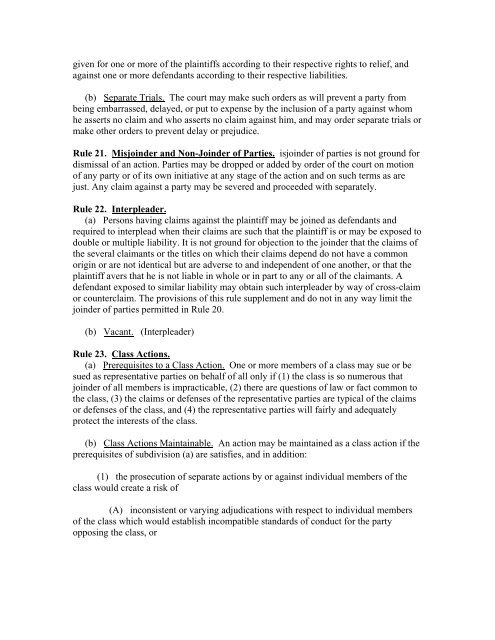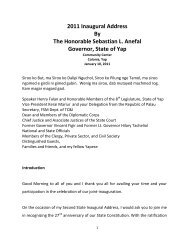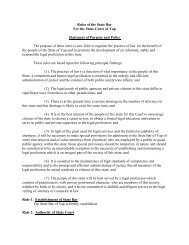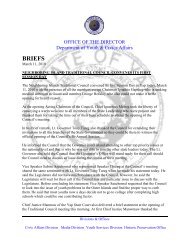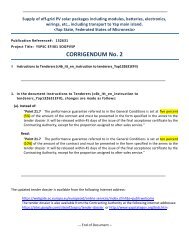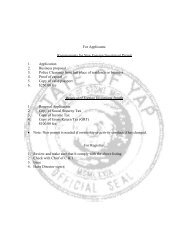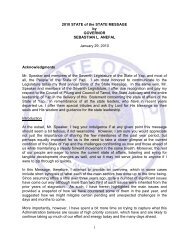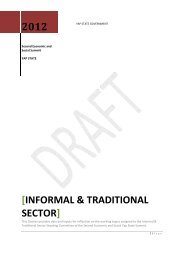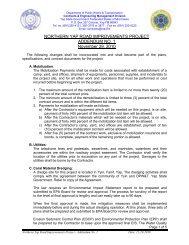RULES OF CIVIL PROCEDURE For the Trial Division of the Yap ...
RULES OF CIVIL PROCEDURE For the Trial Division of the Yap ...
RULES OF CIVIL PROCEDURE For the Trial Division of the Yap ...
Create successful ePaper yourself
Turn your PDF publications into a flip-book with our unique Google optimized e-Paper software.
given for one or more <strong>of</strong> <strong>the</strong> plaintiffs according to <strong>the</strong>ir respective rights to relief, and<br />
against one or more defendants according to <strong>the</strong>ir respective liabilities.<br />
(b) Separate <strong>Trial</strong>s. The court may make such orders as will prevent a party from<br />
being embarrassed, delayed, or put to expense by <strong>the</strong> inclusion <strong>of</strong> a party against whom<br />
he asserts no claim and who asserts no claim against him, and may order separate trials or<br />
make o<strong>the</strong>r orders to prevent delay or prejudice.<br />
Rule 21. Misjoinder and Non-Joinder <strong>of</strong> Parties. isjoinder <strong>of</strong> parties is not ground for<br />
dismissal <strong>of</strong> an action. Parties may be dropped or added by order <strong>of</strong> <strong>the</strong> court on motion<br />
<strong>of</strong> any party or <strong>of</strong> its own initiative at any stage <strong>of</strong> <strong>the</strong> action and on such terms as are<br />
just. Any claim against a party may be severed and proceeded with separately.<br />
Rule 22. Interpleader.<br />
(a) Persons having claims against <strong>the</strong> plaintiff may be joined as defendants and<br />
required to interplead when <strong>the</strong>ir claims are such that <strong>the</strong> plaintiff is or may be exposed to<br />
double or multiple liability. It is not ground for objection to <strong>the</strong> joinder that <strong>the</strong> claims <strong>of</strong><br />
<strong>the</strong> several claimants or <strong>the</strong> titles on which <strong>the</strong>ir claims depend do not have a common<br />
origin or are not identical but are adverse to and independent <strong>of</strong> one ano<strong>the</strong>r, or that <strong>the</strong><br />
plaintiff avers that he is not liable in whole or in part to any or all <strong>of</strong> <strong>the</strong> claimants. A<br />
defendant exposed to similar liability may obtain such interpleader by way <strong>of</strong> cross-claim<br />
or counterclaim. The provisions <strong>of</strong> this rule supplement and do not in any way limit <strong>the</strong><br />
joinder <strong>of</strong> parties permitted in Rule 20.<br />
(b) Vacant. (Interpleader)<br />
Rule 23. Class Actions.<br />
(a) Prerequisites to a Class Action. One or more members <strong>of</strong> a class may sue or be<br />
sued as representative parties on behalf <strong>of</strong> all only if (1) <strong>the</strong> class is so numerous that<br />
joinder <strong>of</strong> all members is impracticable, (2) <strong>the</strong>re are questions <strong>of</strong> law or fact common to<br />
<strong>the</strong> class, (3) <strong>the</strong> claims or defenses <strong>of</strong> <strong>the</strong> representative parties are typical <strong>of</strong> <strong>the</strong> claims<br />
or defenses <strong>of</strong> <strong>the</strong> class, and (4) <strong>the</strong> representative parties will fairly and adequately<br />
protect <strong>the</strong> interests <strong>of</strong> <strong>the</strong> class.<br />
(b) Class Actions Maintainable. An action may be maintained as a class action if <strong>the</strong><br />
prerequisites <strong>of</strong> subdivision (a) are satisfies, and in addition:<br />
(1) <strong>the</strong> prosecution <strong>of</strong> separate actions by or against individual members <strong>of</strong> <strong>the</strong><br />
class would create a risk <strong>of</strong><br />
(A) inconsistent or varying adjudications with respect to individual members<br />
<strong>of</strong> <strong>the</strong> class which would establish incompatible standards <strong>of</strong> conduct for <strong>the</strong> party<br />
opposing <strong>the</strong> class, or


